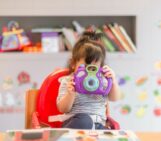
Interview with Calm Mijares by A.M. Bernal-Dela Rosa
No matter what textbook knowledge or college degree you have, molding the character of a child will still teach you new lessons in motherhood. Calm Mijares is a B.S. Psychology graduate and the Human Resource Manager at the Asia Pacific Nazarene Theological Seminary. She shares the challenges of raising her three children ages 12, 9 and 7.
Tell us a little about your background.
I grew up in a very democratic family. There were 9 children in our family, but our parents tried their best to bring us up as unique individuals. They gave us education and positive experiences. They gave us confidence to speak our minds, to express our feelings, and to challenge authorities when we felt they were wrong.
Every time one of us committed a mistake, my mother would say, “You have to report to your father what happened.” Then we held family meetings. If it was really our fault, we needed to say “sorry” for what we had done. Then my parents would ask, “What did you learn from the experience?” We also celebrated any joyful event. Since we were financially challenged, we delighted in small things like a piece of candy, new clothes or positive experience. This is what I’m trying to duplicate, now that I’m a mother.
How did your psychology background help you prepare for parenting?
It helped somewhat but, as I tell Jay when we encounter difficulty with the children, “I didn’t learn this from school.” Our three kids are very different from each other, so we have no concrete pattern of child-rearing for all of them. We just ask for God’s guidance in taking care of them every day.
How do you handle different personalities?
We don’t encourage them to imitate each other. We make them believe that they are beautifully different, and we try to enhance their abilities. We try to understand their different tastes, likes and dislikes and how they interpret things, process experiences and understand concepts. We help them develop and focus on what they do well.
What are other factors that affect children’s development?
Their environment. In our case, we see to it that the environment is very safe and exciting, challenging and educational, whether we are at home or outside. We are very intentional when going out. We ask ourselves, what will the kids learn from this place, or will they enjoy new experiences there.
What do you do when your children ask you to buy them things?
Our family is trained to buy things purposefully. If the children want something, we always tell them they have two options: save from their daily food allowance, or wait for special occasions.
We practice delayed gratification which means we ask our children to wait and save until they are able to purchase what they want. They need to know what they need versus what they want. We buy them the things they need such as food, clothes, water, school supplies, and vitamins but we buy the things they want on special occasions or for certain reasons: for example, as their reward for getting good grades in school.
How important is it to model what you say?
We must walk our talk. Pag bawal sa isa, bawal sa lahat. No one is exempt, not even parents. When we tell the kids not to eat chips before meals, we all follow the rule. If we tell them they shouldn’t eat chocolate, I must resist eating chocolate as well.
Discipline for us is a way of life. We practice the discipline of not wasting anything, whether it is food or resources. Whoever is the last to use the washroom should check the faucet and turn off the lights. Whatever we use, we should put back to where we got it. We discipline ourselves in the right way of doing things.
How do you discipline the kids when they do something wrong?
They need to apologize. If they did not intend to hurt anyone, we ask them to say “sorry” and explain what happened. We do this because we want them to always be conscious that everything they do has consequences and they are responsible for it. But we don’t punish them if they did not intentionally do wrong. If they deliberately hurt someone, disobey, lie or ignore the sibling’s or the parent’s call for help, we deprive them of TV, ban them from playing computer games, make them stand in the corner or make them keep quiet. When we parents have done something to hurt a child, we also say “sorry” and we ask forgiveness. Now that they have matures a bit, we are teaching them the concept of forgiveness. When they say “sorry” our usual response is “I forgive you.” But we also team them that if they forgive the other person, they need to forget what he or she has done. We reprimand them if they bring up the matter after the other one has said “sorry”.
What do you hope will be the long-term effects of the way you are raising your children?
We hope and actively pray that when they grow up, they will all be the persons that God created them to be. We don’t own them; they are God’s gifts to us. We know when the time comes; our children will have their own tasks to undertake. We are just instruments in molding their character and growth. That’s why, although they are still in their formative years, we respect them and consider their opinion. Even if our children are still young, they have their own voice and can make certain decisions. For example, we vote as a family. When one of them speaks, we listen because their words are important. We respect them even at a young age, because we believe that now is their time. They are smart and skillful and we are giving them room to improve and develop.




